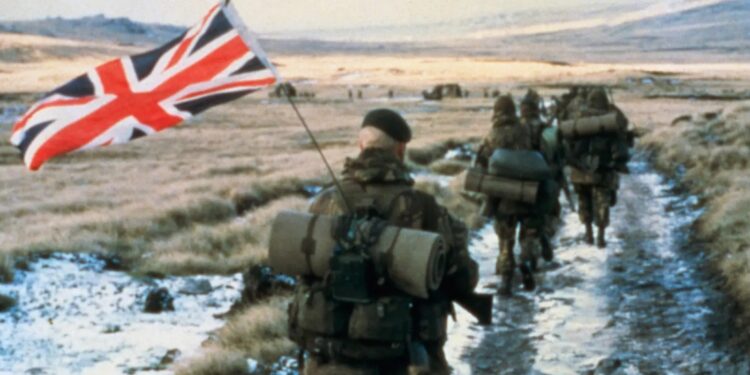The Falklands War, a ten-week conflict between Argentina and the United Kingdom, took place from April 2 to June 14, 1982, over the disputed Falkland Islands. Located in the South Atlantic Ocean, the islands were claimed by both nations, though the UK had maintained control since 1833. Tensions escalated when Argentina, led by its ruling military junta, invaded the islands, seeking to assert its sovereignty and bolster domestic support amid economic troubles and political unrest.
The invasion began on April 2, 1982, when Argentine forces landed on the Falklands and quickly overwhelmed the small British garrison. Argentina’s action was met with international condemnation, and the UK, under Prime Minister Margaret Thatcher, responded decisively. Viewing the invasion as a challenge to British authority and a breach of international law, the UK dispatched a naval task force to reclaim the islands, signaling its intent to fight for sovereignty.
The British task force included two aircraft carriers, HMS Hermes and HMS Invincible, along with a substantial number of warships, submarines, and logistics vessels. The conflict was marked by several key battles, both at sea and on land. The sinking of the Argentine cruiser ARA General Belgrano by the British submarine HMS Conqueror on May 2 was a significant and controversial event, leading to heavy casualties and a shift in Argentine naval strategy. Conversely, the British destroyer HMS Sheffield was hit by an Exocet missile on May 4, resulting in the first British warship sunk in action since World War II.
On land, British forces launched a series of amphibious assaults, beginning with the landing at San Carlos on May 21. This established a beachhead for subsequent operations to retake the islands. The harsh weather and challenging terrain made the campaign arduous, but British troops steadily advanced. The Battle of Goose Green on May 28-29 and the decisive assault on Mount Tumbledown on June 13 showcased the determination and capability of British forces.
By June 14, Argentine forces in the capital, Port Stanley, surrendered, effectively ending the war. The conflict resulted in the deaths of 649 Argentine military personnel, 255 British military personnel, and three Falkland Islanders. The victory had significant political ramifications: it bolstered Thatcher’s government and led to the downfall of the Argentine junta.
The Falklands War remains a pivotal moment in both British and Argentine history. For the UK, it reaffirmed its commitment to defending its territories, while for Argentina, it marked a tragic chapter that ultimately contributed to the restoration of democracy. The sovereignty of the Falkland Islands continues to be a point of contention, but the conflict underscored the complexities of colonial legacies and national pride.
newshub



Recent Comments